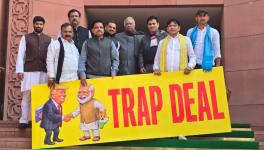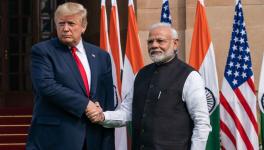CoronaShock: The Greatest Crisis in the History of Capitalism

We are experiencing an unprecedented economic, political and social crisis because of the coronavirus. What has the global pandemic been able to reveal about the political and economic order we have experienced in recent decades? Are we facing the greatest crisis in the history of capitalism?
First, to your last question, this is indeed the greatest crisis in the history of capitalism.
The global pandemic imposed upon the social system the largest inadvertent general strike in modern history. At least half of the global workforce is unemployed, and the withdrawal of their labour immediately has crashed the global growth rate; this proves, for once and for all, the Marxist formula that social wealth is produced by productive labour and not by capital itself or by inventions. It is labour that produces value, and out of value comes the accumulated capital that then operates a dictatorship against the working people; if labour goes on strike – even in this imposed fashion – it proves the Marxist point. That is the first thing that is revealed.
For the past five decades, the capitalist system has struggled with profitability, and has produced a system that has cannibalised social institutions to provide advantages to capital. Globalisation of production along the supply chains, in disarticulated factories that require metropolitan capital to invest less and risk less, had a marked impact on our world; this advance in the productive forces forced subcontractors to raise capital in their countries and to bear the risk of the system, while the big near-monopoly transnational firms used their intellectual property and their control over the supply chain to accumulate vast financial reserves which they turned over – not to productive investment – but to the financial casino and to tax havens. The withdrawal of profits from taxation left states without adequate funds, so they found themselves forced by the authority of the ruling class (by the imperative of states to maintain sound money) and by the authority of imperialism (through the IMF) to cut budgets. Therefore, austerity is a word that we all understand, in all countries of the world. This austerity particularly took place against the social institutions of education, health (including public health), public goods such as transportation, and elder care. The low expenditure towards public health and public medicine in general and the privatisation of medicine left most of the capitalist world weak before the global pandemic. They collapsed in its wake.
Finally, the evisceration of the social side of State policy meant that States did not have the capacity to provide assistance to the public; and the evisceration of trade unions and other such public bodies in the capitalist countries meant that the habits of public action were simply no longer available. That is why people in the capitalist countries are largely dependent on state action, whereas we saw in places like Cuba and Kerala, the people’s organisations worked alongside the State in their response. It is only the Left organisation in these capitalist countries that provided relief without any permission or help from the government; in fact, they are often chastised for their necessary activity.
No doubt that capitalism has shown in this pandemic that it does not have the resilience to enhance the capacity of people both to deal with a crisis and to develop their abilities in non-crisis times.
On the other hand, most governments around the world have been forced to bail out a sumptuous amount of money in an attempt to save the economy and ensure minimal social programs for the population to survive this process. Is there a reassessment of the previous period or is it possible that there is a further deepening of neoliberal policies?
States that report to their capitalist classes have a cliched response to a crisis. All they seem to know, despite the evidence, is to pour money into hands of the corporations in the name of increasing liquidity. During this pandemic, there was in fact no crisis of liquidity. The crisis stemmed from the imposed general strike, the vanishing of labour in the Great Lockdown. That was the reason for the crisis, not a failure of nerve amongst investors who then demanded that financial houses pay them for worthless pieces of paper (which was the case in the 2009 financial crisis); the governments behaved in 2020 as if they were dealing with a liquidity crisis, when what they were dealing with was an employment crisis. And these massive amounts of money went not to deal with the coronavirus recession by itself, but to the powerful corporations. The State realises that the labour force must be kept alive; whatever relief it provides to people is not necessarily on humanitarian grounds, but on practical, pragmatic grounds.
What would have been a better use of the world’s resources? For one, an immediate haircut for the $11 trillion in developing country debt. What does it serve to force Argentina into another deeper crisis? What is gained for the creditors, certainly not their money? Why not allow a haircut on the debt, which is not going to be paid anyway, and whose refusal is simply going to bring deep suffering to people in the developing world and it is going to continue a cycle of indebtedness. Second, the money should have gone towards creation of relief on a massive scale. Half the human population is now hungry; resources should have immediately gone towards the alleviation of hunger.
We must judge this moment by the way the capitalist states have abandoned such vast numbers of people into hunger. To my mind, there is something greatly obscene about a human civilization – namely capitalism – that can produce hypersonic cruise missiles that can strike any part of the earth in under an hour but that does not eradicate hunger. This is an absolute moral failure. And there is insufficient outrage at this, in my opinion. I don’t mean outrage at the existence of the hungry people, which is maddening itself, but outrage at a system that can produce such sophisticated weaponry, can produce enough food to feed everyone, but then allows that food to be destroyed rather than deliver it to people who do not have money power in their hands. The morals of a society are not in its constitutions or in the highest works produced by its philosophers; the morals of a society are available in the way it treats its majority, who live in hunger and illiteracy.
My fear is that unless we change the balance of forces in these capitalist societies, the same old policies will prevail – and worse.
In this sense, much is said that the world will no longer be the same after this process and that it has been able to open up the evils of the neoliberal model. However, most of the public resources are going to the financial system and large companies, further increasing the concentration and centralization of capital, while at the same time we are seeing a relaxation of labor rights to "guarantee" the employment of these people. How can these contradictions be explained?
It is certainly the case that the vast resources doled out by the capitalist states have gone to the corporations and to the financial firms. This has taken place in every one of the states dominated by the capitalist class. Relief is provided, but not nearly enough. The crisis is being used to deepen surveillance systems, to arrest activists, and to undermine labour laws. There is nothing contradictory about this, since here precisely are the elements of a normal capitalist system: having dominated the State, the capitalist class ensures its survival in the short-term, and then uses the weakness of the people to push ahead policies which it feels will give it permanent advantages. In India, the policies are so crude that the government wants to increase the length of the working day – towards ten hours and twelve hours. It is obscene, a return to the 19th century. Super-exploitation of workers has never been foreign to places such as India, where violence in the workplace remains basic and where child labour continues unchecked. But now, as the crisis shines a red light in the face of the capitalist, the only solutions they can think of is to appropriate more money from the exchequer and to demand more of the surplus labour time from the working-class; they don’t know how to do anything else. To expect the capitalist class to be benevolent in a crisis is to misunderstand the nature of capitalism. The system is designed around profit-maximisation and war-like fierce competition; it exaggerates the human trait of greed over other traits and gives it value. Since this is the case, these policies are necessary for both the capitalist class and the State that it dominates.
The scale of the damage is enormous. The International Labour Organisation says that 81% of the world’s workers, over 2.7 billion people, are effectively out of work, and they will lose at least $3.4 trillion in income. Global trade volumes will decline by at least 32%, according to the World Trade Organisation. All of this is very significant. It means that the supply chains, which have come to characterise so much manufacturing, will be damaged, and parts of it fatally. The Great Lockdown will mean that agricultural production might suffer, which could lead to famine in parts of the world. None of this is trivial.
It is my sense that the bourgeois order does not have any idea how to tackle this problem. They are using all their old tricks – flooding the market with liquidity, threatening China, proceeding with militarism against Venezuela and Iran. Rather than these approaches, governments need to hastily consider how to manage trade in the age of possible pandemics, how to transform economic activity so that it is less reliant upon the massive global trade volumes, to build regional economies rather than one big global economy, to ensure that billions of workers and peasants are not merely so many articles of commerce but are people who can help shape the economic activity to which they are central. Will there be massive spending in public health? That’s the very first thing that is necessary. There is no public discussion about this at all. During the crisis, everyone is saying that nurses are essential; when the crisis is over, nurses will once again be forgotten. This is the failure of the bourgeois order.
In this sense, one of the sectors that is growing the most in this process is technology. No wonder Jeff Bezos, owner of Amazon, may become the world's first trillionaire in the next period. What does this exponential growth of "platform capitalism" represent and what are its consequences?
Before the Great Lockdown, the major platform companies (Amazon being the largest) had already absorbed considerable amounts of the retail market; their pursuit is to get people to buy everything from the web, and thereby destroy brick and mortar stores. During the Lockdown, many more people developed the experience of using these platforms to buy a range of goods. This was the most effective training for the use of platforms; many will not return to the brick and mortar stores after the Lockdown ends, having seen how convenient it is to buy via the web. There is already expectation that more and more goods and services will be permanently traded via the web rather than through face-to-face retail. But we should not exaggerate this; it will certainly become dominant in the advanced capitalist states where Internet coverage and electrification are common, but it cannot take place in parts of the world where the Internet coverage is spotty. Nonetheless, the platform firms will certainly wipe out many family businesses, which – as the evidence shows – employ more people in aggregate than these platform firms. The social ecology of cities might be impacted, as retail shops will go out of business. Not even sure about the return of cafes and restaurants, since people in the immediate aftermath of the pandemic will still be wary of returning to open air spaces for food; food delivery, again via the platform, will expand. It is to be seen what all this means for the retail sector.
More than anything, the growth of the platform firms has downstream implications to the productive sector. Already we see that the transnational firms – such as Amazon – have such dominance over the supply chain that they are able to dictate terms to their suppliers, who are often smaller sub-contractors who then intensify the exploitation of the workers that they hire; the pressure from the platforms develops a race to the bottom compulsion amongst the sub-contractors, and therefore a hellish existence for the workers in various forms of free trade zone and maqiladoras and factory farms. As we look at the increasing dominance of the platform firms, we should not ignore the squeeze that this will place on the productive sector.
Another element that seems to be intensifying with the pandemic is the crisis between the US and China. The perception is that the Asian country can come out much stronger from this process because of its attitudes towards facing the covid-19. What can we expect in world geopolitics in the coming period in relation to the strengthening of China and a possible loss of US hegemony?
I feel deeply that we face a great crisis ahead of us. China is now the home to the world’s manufacturing, and it has used its massive surpluses to shore up commercial arrangements on all the continents; it also has a foreign policy based on the idea of mutual benefit, which has enabled it to earn the goodwill of many countries, including Italy in the heart of Europe. Furthermore, China’s response to the coronavirus and to COVID-19 has been exemplary. Once it became clear to the scientists that the coronavirus could be contracted between humans, the Chinese government shut down Wuhan city, which is a city of eleven million, then conducted phased shut downs, as well as summouned public action from the communist party, trade unions, and others people’s organisations (including neighbourhood committees). In any other world, the Chinese would be congratulated for their approach to this virus.
On the other hand, we have the United States, which for a long time has used any means necessary to maintain its preponderant power. Brazil saw this first hand, when the US participated in a coup in 1964 that strengthened the anti-communist forces who used terror within Brazil to fragment the people’s movements and then exported that method across South America; such methods did not embarrass the United States, despite its formal protestations of liberalism. This violence manifests itself in the US having the largest military force on the planet by a factor of many; and it continues to develop new weapons systems, including hypersonic cruise missiles, which can strike anywhere on the planet within an hour. They are very dangerous, and they entirely overthrow any theory of detereance.
The US is unhappy that China has emerged as a major science and technology power. It was acceptable for China to be the workshop of the world, to deliver its skilled and healthy labour force for transnational capital; but once China became a leader in high-tech – such as 5G – this was a generational threat to US power. It was in this context that the trade war took place, and it is in this context that the US is using the COVID-19 pandemic to dent China’s image and to reorganise the supply chain out of China. Belligerent language follows this recognition of Chinese growing independence from the US-dominated system, and this belligerent language combined with the dangerous weaponry takes us to the edge of warfare in the South-China Sea. These are dangerous times.
That is why we have floated the Bouficha Appeal Against the Preparations for War. We hope that people’s movements and parties will campaign with this Appeal to make the Appeal a material force in the lives of people around the planet. We must build an international peace movement against US belligerence.
Since we mention China, we have seen a certain success in controlling the spread of the virus in socialist countries such as China itself, Vietnam, the state of Kerala, India, Portugal, Cuba and Venezuela, for example. What lessons can be learned from these processes and what can they reflect on the political life of the planet?
If you look at the socialist order – from China to Vietnam to Kerala to Cuba to Venezuela – you will find a very different approach to the crisis. At Tricontinental: Institute for Social Research, we call this difference CoronaShock. CoronaShock is a term that refers to how a virus struck the world with such gripping force; it refers to how the social order in the bourgeois state crumbled, while the social order in the socialist parts of the world appeared more resilient. It is crucial to study carefully what was done in the socialist order, and to inform people about what one learns; there is more hope from the Left Democratic Front government in Kerala than from the entire G20 leadership put together.
The Left must look in two directions. First, we must be working to provide as much support as possible to our health workers – doctors, nurses, medics, paramedics, ambulance drivers, janitors – who are tackling a very infectious disease, and are doing so, in the bourgeois world order, under austerity-designed conditions. The values of a society are not in the constitution of its country, but in its budgets; and the budgets of the bourgeois order have cut deeply into the health sector. The crisis before us is not just the crisis of the virus, which is genuine, but it is doubled by the crisis of a health system that has been delivered for private profit and so therefore relies upon the super-exploitation of health workers. Second, we must be working to provide relief for the vast numbers of unemployed marginal workers – the informal sectors workers who live for their daily and weekly wages and are often without bank accounts and without access to both personal savings and government cash transfers. In socialist parts of the world – from Vietnam to Kerala, from China to Venezuela – food pantries have been set up to provide direct nutrition to the working-class; this is an essential activity, which is utterly normal in a socialistic society but is simply not so easy to do in the bourgeois order.
Based on this realization, we need to understand fundamentally the difference between the bourgeois order and the socialist order, as exemplified by the difference between Vietnam – as an example – and Italy. The former, closer to China, has had no deaths from COVID-19 and handled the entry of the virus with a scientific methodology; the latter was convulsed by the disease, and found it very hard to break the chain of infection. What accounts for the difference between Italy and Vietnam? It is precisely five factors: a scientific approach by the political leaders, swift state action to prepare for the virus, large-scale public action by organisations of the people, immediate relief to enable the people to honor the lockdowns, and a commitment to internationalism which included the production of protective equipment for solidarity donation. This last point meant that there was not even a gesture of xenophobia in Vietnam’s reaction to the disease; for this, the Prime Minister Nguyễn Xuân Phúc must be congratulated for leading from the top.
Finally, faced with a deepening of neoliberalism, the advance of the extreme right and neofascism in several countries, as in the case of Brazil, a certain disorganization of the left and the impossibility of holding street demonstrations - the main tool of popular organizations - is it possible to have hope? Where do we grab it?
The Left must attend to the fact that the reservoirs of our strength – trade unions and peasant unions – have been grievously weakened. Building organisations of the working-class and the peasantry as well as of precarious workers is essential. There is no substitute for firm organisations. It is not enough for us to have ideas and to have even the pulse of the public. If we have no organisational capacity, it is impossible to outflank the neo-fascists who take suffering and convert it through hateful alchemy into hate. During the pandemic, the left around the world has attempted to maintain our strength, to continue to build momentum and not let it fall apart. Socialism is hard to build in solitude and the majority of our class do not participate – for a variety of reasons – on the internet (lack of access being the main one, even if there are mobile or cell phones). We know that the suffering is acute. We are amongst the people delivering relief. We must hope that when the pandemic runs its course that we will be able to remain amongst the people with a programme of action that grips their anxieties. The programme of action for a post-COVID 19 world must be robustly rooted in a socialist imagination.
The failure of the capitalist states to deal with the pandemic is merely another chapter in the hideousness of the human experience. But the hideousness of the human experience has another side. And the other side is our capacity to struggle to be decent. Let’s not get bogged down in the hideousness. We must dialectically remember that we have the capacity as sensitive people to struggle for something decent. That’s what we’ve got to live for. Don’t get bogged down in isolation. You must live with social solidarity.
Vijay Prashad is the Director of Tricontinental: Institute for Social Research, Chief Editor of LeftWord Books, and Chief Correspondent at Globetrotter. His most recent book is Washington Bullets (LeftWord Books, July 2020).
Get the latest reports & analysis with people's perspective on Protests, movements & deep analytical videos, discussions of the current affairs in your Telegram app. Subscribe to NewsClick's Telegram channel & get Real-Time updates on stories, as they get published on our website.
























